 The part of the equation which is on the left of the sign of equality is called the first member ; the part on the right of the sign of equality, the second member. The part of the equation which is on the left of the sign of equality is called the first member ; the part on the right of the sign of equality, the second member.  A Treatise on Algebra ... - Page 9by William Smyth - 1861Full view A Treatise on Algebra ... - Page 9by William Smyth - 1861Full view - About this book
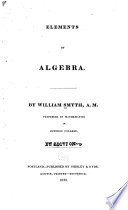 | William Smyth - Algebra - 1830 - 278 pages
...quantities on one side the sign = in an equation are called a member ; an equation has two members. The one on the left of the sign of equality is called the first member, and the other the second. The quantities, which compose a member, when separated by the signs -f- and — , are called terms.... | |
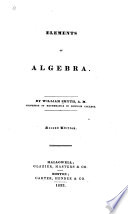 | William Smyth - Algebra - 1833 - 288 pages
...two expressions for the same thing will therefore be equal to each other, and we have x -j- 25 = 4 x An expression for the equality of two things is called...first member, and the other the second. If a member consist of parts separated by the signs + an^ — , these parts are called terms. Thus in the equation... | |
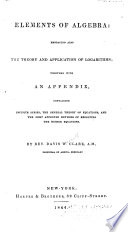 | Davis Wasgatt Clark - 1844 - 394 pages
...quantities connected by the sign of equality. 152. The monomial or polynomial quantity which is written on the left of the sign of equality is called the first member ; that which is written on the right, the second member. An equation, then, is composed of two members... | |
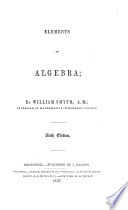 | William Smyth - 1847 - 276 pages
...two expressions for the same thing will therefore be equal to each other, and we have z + 25 = 4*. An expression for the equality of two things is called...parts are called terms. Thus in the equation x -j- 25 = 4a;, the expression x -j- 25 is the first member and 4 x the second. A figure written before a letter,... | |
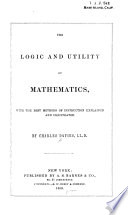 | Charles Davies - Logic - 1850 - 398 pages
...between two quantities is expressed by the sign of equality, which is placed between them. The quantity on the left of the sign of equality is called the first member, and that on the right, the second member of the equation. The first member corresponds to the subject of... | |
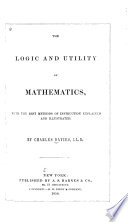 | Charles Davies - Logic - 1850 - 402 pages
...between two quantities is expressed by the sign of equality, which is placed between them. The quantity on the *)* «• left of the sign of equality is called the first mem- ^^n,^ ber, and that on the right, the second member Mnu . mhcr . of the equation. The first member... | |
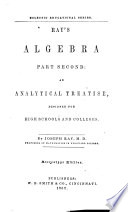 | Joseph Ray - Algebra - 1852 - 408 pages
...equation is composed of two parts, separated from each other by the sign of equality. The quantity on the left of the sign of equality, is called the first member or side of the equation. The quantity on the right, is called the second member or side. The members... | |
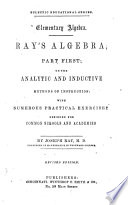 | Joseph Ray - Algebra - 1848 - 250 pages
...question is composed of two parts, separated from each other by the sign of equality. The quantity on the left of the sign of equality, is called the first member, or side of the equation. The quantity on the right, is called the second member, or side. The members... | |
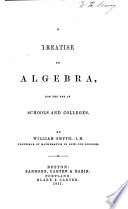 | William Smyth - Algebra - 1855 - 370 pages
...these two expressions for the same thing will therefore be equal to each other, and we have zj-25 = 4z. An expression for the equality of two things is...these parts are called terms. Thus in the equation x -\- 25 = 4z, the expression x -j- 25 is the first member and 4z the second. A figure written before... | |
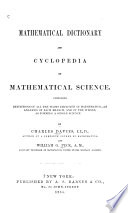 | Charles Davies, William Guy Peck - Electronic book - 1855 - 592 pages
...by л and ¿. Every equation is composed of two parts, connected by the sign of equality. The part on the left of the sign of equality, is called the first member, that on the right, the second member. The second member is often 0. Equations are divided into two... | |
| |